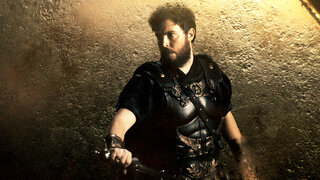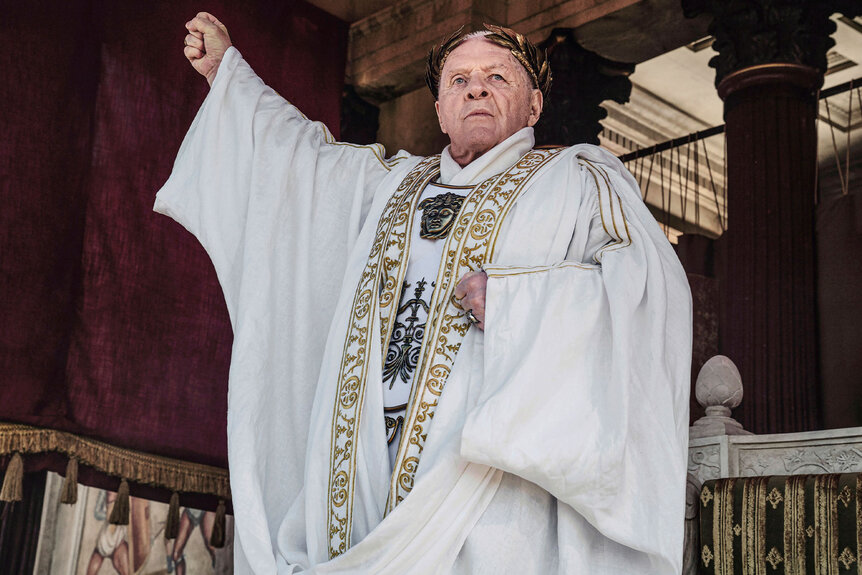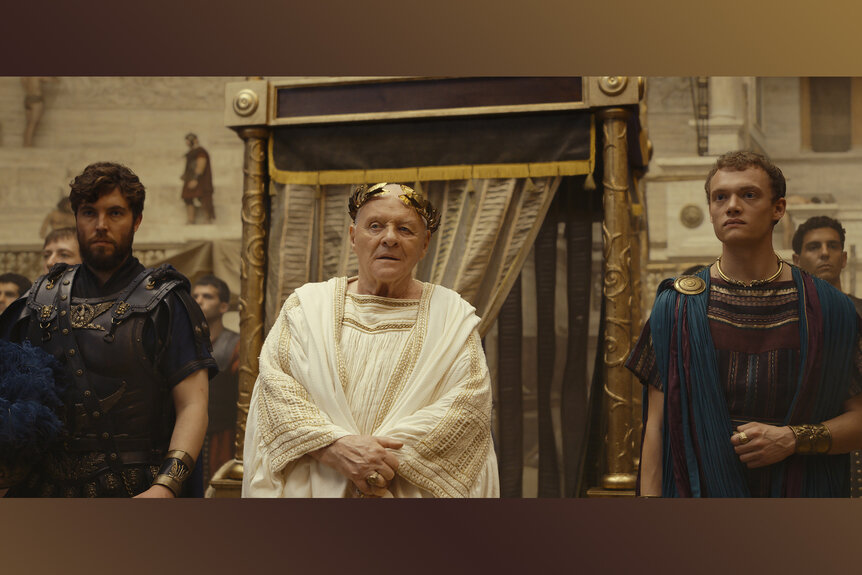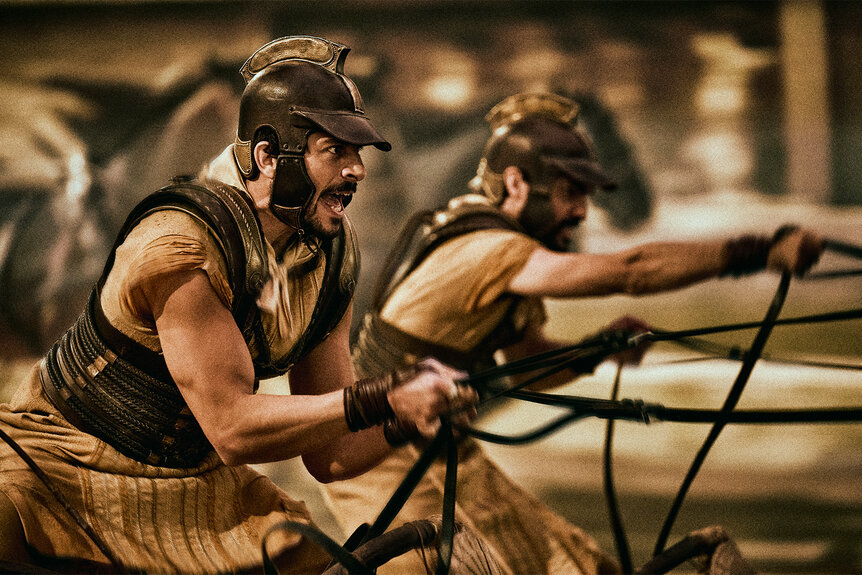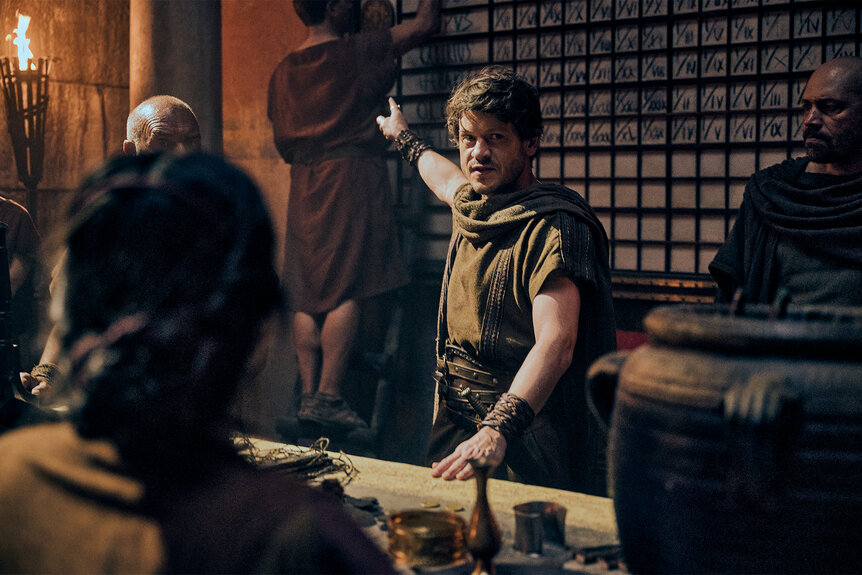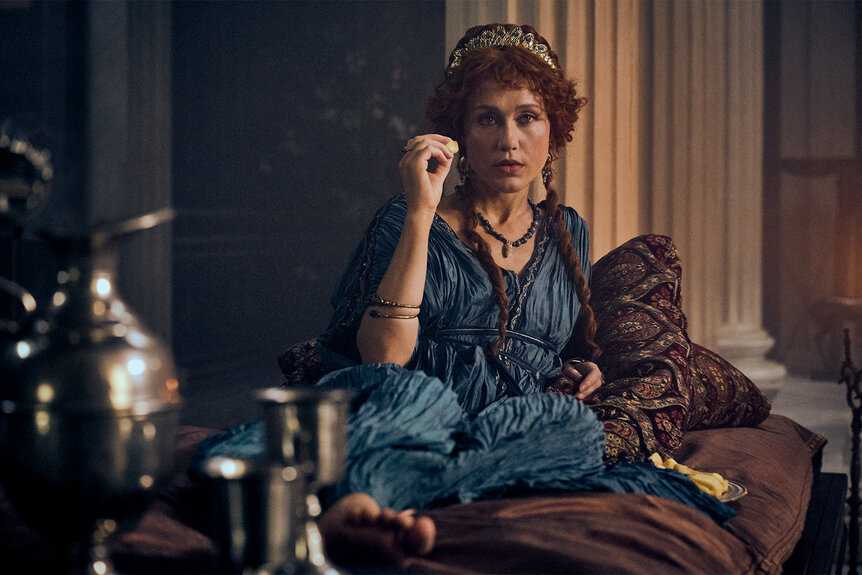The True Story Behind Those About to Die: Where Fact Meets Fiction in Peacock's Epic Roman Saga
Peacock's new historical drama is fictionalized, but it's rooted in very real history.
In Peacock's Those About to Die, viewers will find a sprawling story rooted in the real history of Ancient Rome, at a time when chariot racers were celebrities, betting taverns ruled the underworld, and an Emperor sought to secure his dynasty's place in history. The show's massive cast of characters, led by Anthony Hopkins as Emperor Vespasian, covers a wide range of lifestyles, backgrounds, and conflicts within Rome. And while many of those characters are fictional, the show is rooted in very real history.
RELATED: Did Those About to Die Really Film in Rome?
So, exactly what is the true story behind Those About to Die? Let's take a closer look at the show's portrayal of Ancient Rome, and hear from the cast about what they learned.
The Real Historical Figures of Those About to Die
In 68 AD, the Roman Emperor Nero died, ending the Julio-Claudian dynasty that was launched by Caesar Augustus and throwing Rome into turmoil. What followed was a period of crisis known as the Year of the Four Emperors, so named because four different rulers emerged to try to lead the Empire in very rapid succession during a time of infighting and violence. By the end of 69 AD, the last of these four Emperors, Vespasian, emerged as a new force of stability.
A military commander promoted to the throne by his own armies, Vespasian sought to cement his rule, in part, by endearing himself to the Roman people through building projects and games. When Those About to Die begins, he's been emperor for 10 years, the Circus Maximus is the city's greatest entertainment venue, and Vespasian is set to top it with the launch of what's known as the Flavian Amphitheatre, better known to us now as the Colosseum.
Titus and Domitian
Helping Vespasian in these endeavors are his two sons: the military commander Titus (Tom Hughes), and the politician and master of Roman games Domitian (Jojo Macari). Both Titus and Domitian would go on to be emperors in their own right, and as we pick up on their story, Vespasian is still in the process of deciding which of his sons will directly succeed him, marking the first time a biological son has succeeded their father as Roman Emperor (previously adopted sons and designated heirs had taken the throne).
For Macari and Hughes, playing Roman Emperors meant striking a delicate balance between real history, and finding the truth in the drama of creator Robert Rodat's story.
RELATED: Those About to Die: Everything to Know About the Cast & Characters in Peacock's Gladiator Series
"Domitian is a very well documented man," Macari told NBC Insider. "He did a lot and he's written about a lot, half of it being truth, half of it being false. Interestingly about Domitian, he was very hated. And so after he was assassinated, a lot of lies were told about him ... we assume."
Hughes added, "I think for some people, research is their way in, and look, there's a professional obligation to understand the context of the time in which you're portraying the character. Of course, you've got to know what's happening socially and politically in that era, of course. But the real job, I think is to bring that animal, that human being to life and think about how that animal feels within the constraints of their existence. And for me, that's often rhythmical and that's often something almost kinetic, molecular almost that I'm trying to find."
The brothers find themselves at odds through much of Season 1, with their feud to be emperor of Rome simmering throughout the series, a tension that is well-documented in Roman history.
Those About to Die's Scorpus Was a Real Roman Sports Star
But Emperors are not the only real historical figures within the story. Because it's inspired by Daniel P. Mannix's book of the same name, about gladiators and games in Ancient Rome, Those About to Die also turns its focus to the reality of the various competitors in Roman games. One of them, Scorpus (Dimitri Leonidas), was a real chariot racer in the city's Circus Maximus, and a beloved celebrity in his own time. We have our star quarterbacks and basketball icons, and Rome had people like Scorpus.
"One of the fascinating things I found when researching for Scorpus was, there's a famous Roman poet called Martial, and his poetry has kind of lasted since 2,000 years ago, but he actually wrote poems about Scorpus," Leonidas said. "And reading them was quite amazing because they reference things like 'The Gods, counting how many races you won, must have mistaken you for an old man, and that's why he took you at a young age.' And just little things like that, that you get a sense of what Scorpus was known for at the time."
Though little is known about Scorpus outside of his racing career, it's believed that he was born around 68 AD and died around 95 AD, which means Those About to Die is taking a few liberties with his chronology and life story.
Was Tenax from Those About to Die a Real Person?
No. While people like Vespasian, Titus, Domitian, and Scorpus were real historical figures whose existence is documented by historians, many of the other major players in Those About to Die are fictional creations of the show, characters who emerge to create drama in the landscape of this particular time and place. Still, because the series is rooted in nonfiction, each of those fictional characters is also rooted in real historical events and characters, and the actors who play them did their research accordingly.
In the case of Iwan Rheon, who plays betting tavern owner Tenax within the show's Roman underworld, that meant a deep dive into everything that led to the moment the series begins.
RELATED: How Peacock's Those About to Die Brought Ancient Rome to Life (EXCLUSIVE)
"Dimitri, who plays Scorpus said, 'Oh, there's this great podcast, The History of Rome Podcast, and I listened to that," Rheon said. "I listened to it three times up until the point of our story, because I wanted the knowledge of the past. I wanted to understand how [Tenax] got to where he is. And I think using those historical milestones, especially Nero's reign into the Year of the Four Emperors, and then the 10 years of relative peace that precedes our series in 79, I understood how Tenax has clawed his way up from being living on the street. And I could sort of map it out, and that made a lot of sense to me. It just helped me personally."
Finding Character Inspiration in Real Roman History
Outside of the underworld, among the city's nobles, there are characters like Antonia, played by Gabriella Pession. The wife of a powerful politician who also owns a major stake in one of the city's chariot racing factions, Antonia emerges as the woman behind the power, adept at manipulating circumstances to suit her own needs and desires. She's a fictional character, but to imbue Antonia with a certain truth, Pession did copious research on real Roman women of power and influence.
"To really kind of understand how Patrician women were living at that time, I read different biographies about different women in ancient Rome," Pession said. "One was Livia Drusilla, which was Octavian's [Augustus] wife, who was a tough woman. And also Messalina [the third wife of the Emperor Claudius], who was known to be very young, very promiscuous, very beautiful, very manipulative, very corrupted. Or Agrippina Minore [Claudius' fourth wife and the mother of Nero], Poppaea [Sabina, one of Nero's wives]. There are many, many, many Roman women that I read about that had elements that I put into Antonia."
To get the whole story, tune into Those About to Die, now streaming on Peacock.
